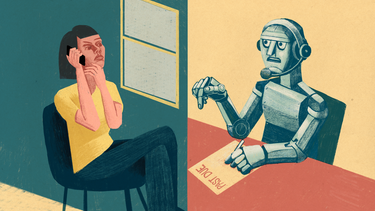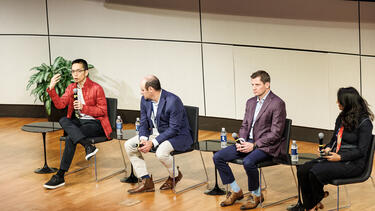Data and AI
A Machine-Learning Model Can Help Reunite Long-Separated Families
Hundreds of thousands of children in China have been separated from their parents. A Yale SOM study finds that a machine-learning approach could cut years off family reunification efforts by matching imperfect, self-reported memories from parents and children.

Will Self-Driving Cars Lower Ride-Hailing Prices?
Lower cost is one anticipated advantage of incorporating autonomous vehicles (AVs) into ride-hailing services. But a study co-authored by Prof. Zhen Lian suggests that lower prices will only materialize under certain market conditions, such as using a single app for both AVs and human drivers.

Can AI Replace Human Debt Collectors?
New research co-authored by Yale SOM Professor James Choi finds that people are less likely to follow through on a commitment to repay a debt if it’s made to an AI agent. The finding hints at one area where humans may always retain an advantage over bots.

Can AI Help Identify Persuasive Salespeople?
For a new study, Yale SOM’s K. Sudhir and his co-authors used machine learning to break down effective persuasion into elements like body language, vocal inflection, and spoken words. The work could help companies consider a wider range of candidates when they are hiring for a sales role.

What Does Responsible AI Look Like?
Business leaders discussed how companies can reinvent themselves to succeed in the evolving AI economy as part of a student-led conference at Yale SOM.

When AI Is the Editor, Consumer Complaints Are More Likely to Succeed
An analysis of complaints submitted to the Consumer Financial Protection Bureau reveals that consumers are using tools like ChatGPT to help them articulate their concerns. Those AI-edited grievances have a higher likelihood of receiving relief, according to new research co-authored by Yale SOM’s Jiwoong Shin.

Who Will Finance the AI Revolution?
Deployment of AI is accelerating exponentially, and the nascent industry requires unprecedented investment to grow. We spoke to two Yale College alums and leaders at Goldman Sachs about where the capital to support an AI transition is coming from.

The Right Approach to State Regulation of AI
Yale SOM’s Jeffrey Sonnenfeld and co-author Stephen Henriques write that Connecticut should begin by applying its existing consumer protection, civil rights, and data protection laws to artificial intelligence, rather than scrambling to create new laws that could hamper innovation in the state.

Our Most-Read Stories of 2024
This year, faculty and alumni experts helped us understand issues including the expanding role of AI in our society, the new space economy, the impact of gender in the workplace, the keys to financing a greener economy, and the psychological quirks that lead us toward irrational economic choices.

Who Is Responsible When AI Breaks the Law?
Former Secretary of Homeland Security Michael Chertoff and Miriam Vogel, president and CEO of EqualAI, survey how AI both fits in and breaks existing legal frameworks. They argue that leaders need to be ready for the opportunities created by the novel technology and for potential legal pitfalls.

How AI Is Already Transforming Fortune 500 Businesses, According to Their CEOs
At a recent Yale CEO Summit, Prof. Jeffrey Sonnenfeld talked to business leaders about the AI tools and other new technologies appearing everywhere from back offices to fast-food kitchens. Sonnenfeld and co-author Steven Tian outline the looming changes in a variety of sectors.
